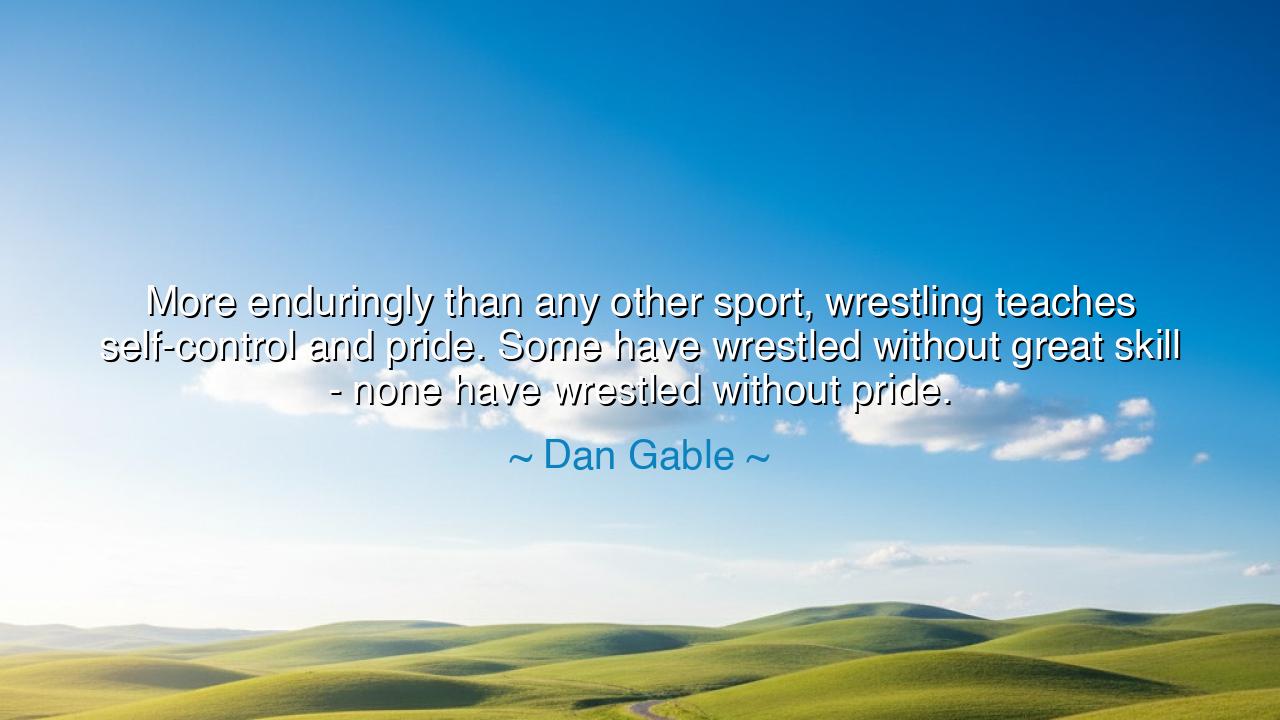
More enduringly than any other sport, wrestling teaches
More enduringly than any other sport, wrestling teaches self-control and pride. Some have wrestled without great skill - none have wrestled without pride.






When Dan Gable, the legendary American wrestler and coach, declared, “More enduringly than any other sport, wrestling teaches self-control and pride. Some have wrestled without great skill — none have wrestled without pride,” he spoke as one who had walked through fire and emerged tempered like steel. His words are not about sport alone, but about discipline, struggle, and the sacred art of self-mastery. For in wrestling, as in life, the true contest is not against another, but against oneself. Every match is a mirror; every victory is a triumph not over the opponent’s body, but over one’s own doubt, fear, and weakness.
Gable, whose name is spoken with reverence wherever wrestling mats are laid, knew this truth through suffering as much as through triumph. As a young man, he faced a wound few could bear — the murder of his beloved sister. Out of that darkness he forged his strength, pouring his grief and rage into the discipline of wrestling. He became an Olympic champion, undefeated in college until his final match, where even in defeat he learned the deeper lesson of his craft: that control of the self is the foundation of greatness, and that pride, rightly held, is not arrogance but dignity born of effort. His quote is the voice of experience — the distilled wisdom of a life shaped by struggle, loss, and perseverance.
In the ancient world, wrestling was seen as a sacred discipline. The Greeks called it pale, and they believed it to be the truest test of both body and soul. Heroes such as Heracles and Theseus wrestled not merely to conquer others, but to prove the worth of their spirit. To wrestle was to meet the earth itself — to fall, to rise, to endure. The dust, the sweat, the strain — these were the forge in which character was made eternal. Gable’s words echo that ancient ideal. He reminds us that wrestling, more than any other sport, demands the surrender of impulse and the mastery of passion. It teaches that to win, one must first learn to command oneself.
Yet Gable’s wisdom also speaks to the paradox of pride. He does not mean the shallow pride of boasting, but the deep pride of presence — the pride that comes from giving one’s all, from refusing to yield, from standing firm even in loss. “Some have wrestled without great skill,” he says, for talent is not the measure of the wrestler’s heart. But none have wrestled without pride — for even the novice who dares to step upon the mat carries within him the courage of confrontation, the willingness to test himself before the eyes of others and the judgment of his own soul. That is the essence of human dignity: to struggle, to fall, and to rise again unashamed.
Consider the story of Gable’s final Olympic match in 1972, when he wrestled six opponents — and did not surrender a single point. Not one. Such perfection was not born from strength alone, but from a lifetime of restraint, focus, and unwavering purpose. Gable wrestled like a man possessed by destiny, yet anchored by humility. After the match, when the world hailed him as invincible, he turned to coaching — devoting his life to shaping others. He knew that the mat was not the end but the beginning, that the real victory was not a medal of gold but the ability to discipline the mind, to teach others to conquer themselves.
From this, the lesson shines clear: discipline and pride are the twin pillars of greatness. Without discipline, pride becomes arrogance; without pride, discipline becomes servitude. The wrestler walks the narrow path between the two — fierce in spirit, yet humble in heart. And this path is not limited to sport. Every craftsman, every thinker, every warrior of the spirit must wrestle daily with doubt, with fatigue, with the forces that would pull him away from purpose. In that struggle, each becomes a wrestler — and each must learn, as Gable did, to find strength in self-control and honor in perseverance.
So, my child, remember this truth: to wrestle is to live. Life will throw you down, and you must learn to rise with grace. You may not always have skill, but you must always have pride — not the pride that shouts, but the pride that endures. Train your mind as you would your body; govern your emotions as a warrior guards his sword. When you fall, do not despair, for the fall itself is your teacher. And when you stand, do so not for glory, but for gratitude — that you were tested, and you did not turn away.
For as Gable’s words remind us, no one wrestles without pride, and no one who lives with self-control and courage wrestles in vain. The mat is life’s altar, and the match is endless — but the victory belongs always to those who keep their spirit unbroken and their will aflame.






AAdministratorAdministrator
Welcome, honored guests. Please leave a comment, we will respond soon